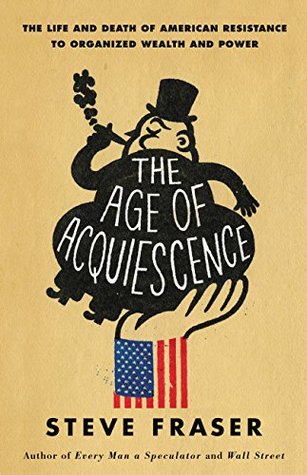More on this book
Kindle Notes & Highlights
by
Steve Fraser
Read between
June 2 - June 3, 2020
When half a million workers struck on May 1, 1886—the original “May Day,” (although not memorialized until the next year to honor the executed Haymarket anarchists), still celebrated now most places in the world except in the United States, where it began—the strikers called it Emancipation Day. How archaic that sounds. Such hortatory rhetoric has gone out of fashion. The eight-hour day movement of 1886 and the mass strikes that preceded, accompanied, and followed it were a freedom movement in the land of the free directed against a form of slavery no one would recognize or credit today.
Werner Sombart, a renowned early-twentieth-century German sociologist, observed
“On the shoals of roast beef and apple pie socialistic Utopias of every sort are sent to their doom.”
And such orthodoxy could be harsh indeed. Minister William Slocum’s message to the National Conference on Charities and Corrections warned, “Indiscriminate alms giving is a crime against society. It saps the very foundations of the self-respecting home.” Poverty researcher and charity reformer Robert Hunter noted, “The sins of men should bring their own punishment, and poverty which punishes the vicious and the sinful is good and necessary.” In fact much of the religiously inspired charity reform of the Gilded Age aimed not at providing charity but denying it, finding most applicants wholly
...more
The long nineteenth century had given birth to a plutocracy unschooled and indisposed to win the trust and preside over a society it feared. Instead, the plutocracy preferred playacting at aristocracy, simultaneously confirming all the popular suspicions about its real intentions and forming a Society that had forsaken society.
In 1945, 40 percent of American families lived below the poverty line; only 44 percent owned homes; just 54 percent had cars. By 1970, 63 percent of Americans owned their own homes, only 10 percent lived in poverty, and there were as many cars as there were families.
Moreover, the “welfare state,” for all the tears now shed over its near death, was in its origins in late-nineteenth-century Europe a creature of conservative elitists like Bismarck or David Lloyd George, and had been opposed by the left as a means of defusing working-class power and independence, a program installed without altering the basic configurations of wealth and political control.
A culture so inhibited, engaged in a chronic self-censorship, loses its power to mount sustained resistance, to challenge vested authority—unless it became out of touch, as the Southern establishment soon came to be perceived. A state of permanent warfare (which as a state of mind is what the Cold War became) normalizes conformity, demands it in the public interest, is intolerant of deviation and dissent.
Today there are more people dealing cards in casinos than running lathes and almost three times as many security guards as machinists.
Between 1979 and 1997 the rate of personal bankruptcy rose by 400 percent.
Between 1979 and 2012, the productivity of the average American worker, after inflation, rose by 85 percent but the average, inflation-adjusted wage increased by only 6 percent and wages in manufacturing declined by 21 percent.
Tragic fatalism of the kind conveyed by The Wire is a version of our general condition that accepts as natural and inevitable what might have alarmed and agitated past generations. What comes to seem normal is assumed to be not only real but right, or is not noticed at all, or is so frequently noticed its impact becomes negligible.
As John Maynard Keynes, otherwise a high priest of limousine liberalism, once put it: “Modern capitalism is absolutely irreligious, without internal union, without much public spirit… a mere congeries of possessors and pursuers.”
For the evangelical world more generally, the state plays the role once performed by the diabolic financial arachnid of nineteenth-century Populist dramaturgy: it is a demonic beast, ravenous for power, working in league with global finance including the International Monetary Fund, the World Bank, and Beck’s favorite, the Federal Reserve. It manipulates and extirpates the remnants of democratic individualism. And it must be said that minus the satanic imagery, they have a point.19


